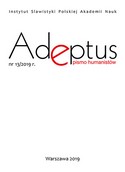The Japanese concept KOKORO and its axiological aspects in the discourse of moral education
The Japanese concept KOKORO and its axiological aspects in the discourse of moral education
Author(s): Tereza NakayaSubject(s): Ethics / Practical Philosophy, Semantics, Philology
Published by: Instytut Slawistyki Polskiej Akademii Nauk
Keywords: ethics; Japan; Japanese; kokoro; kokoro no kyōiku; Kokoro no nōto; moral education; moral values;
Summary/Abstract: This article on the axiological aspects of the ‘Japanese mind/heart/soul’ focuses on the native Japanese word kokoro, which is extremely polysemous, frequently appears in various contexts and can be considered one of the Japanese cultural concepts or keywords. The primary concern here is the axiological aspects of KOKORO in the discourse of contemporary moral education. The first part presents the basic semantic structure of the word kokoro and its comparison with similar words in other languages. The next section summarizes the social changes leading to the emergence of kokoro as a keyword, and its way to the discourse of moral education. It also examines what cultural and moral values of Japanese society can be revealed through the study of the cultural keyword kokoro. The final part presents the results of a content and semantic analysis of a four-volume edition of study material for moral education classes Kokoro no nōto (2002, revised in 2009).
Journal: Adeptus
- Issue Year: 2019
- Issue No: 13
- Page Range: 1-22
- Page Count: 22
- Language: English

